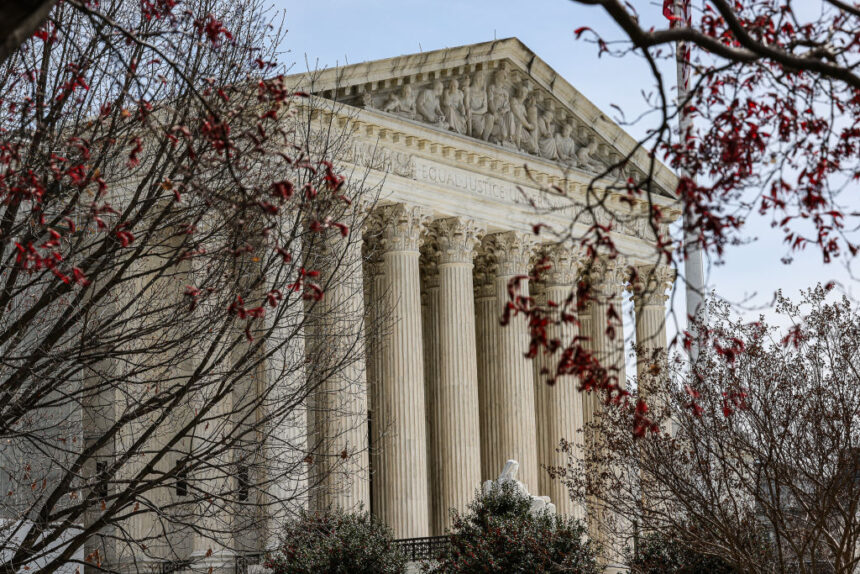The Supreme Court heard arguments Tuesday in a highly-watched case that will determine access to mifepristone — the commonly used abortion pill that accounts for more than half of all abortions.
In the case — the biggest since 2022’s Dobbs case that overturned Roe v. Wade — anti-abortion groups sued the Food and Drug Administration, arguing against its approval of mifepristone, as well as its moves in 2016 and 2021 to expand access to the drug.
If the justices rule in favor of the anti-abortion plaintiffs, it could significantly restrict access to the pill — which was used for about 63% of all abortions last year.
Unpacking the case
The FDA originally approved mifepristone in 2000. The agency has adjusted the label several times since then, including extending the approved time period for use from seven to 10 weeks of pregnancy in 2016.
Five years later, spurred by the COVID-19 pandemic, the FDA removed in-person dispensing requirements, allowing patients to access the pill via telemedicine and mail.
In the ongoing case, Alliance for Hippocratic Medicine v. FDA, anti-abortion plaintiffs have argued that the FDA breached its authority when it approved mifepristone and expanded its access.
Their legal standing, they have argued, is that anti-abortion doctors in the groups are “injured” by patients who take mifepristone because they are diverted from caring for other patients.
If justices side with the plaintiffs, that means patients might lose access to mifepristone prescriptions via telehealth and mail — even in states where abortion rights are protected.
Potential impact on pharma industry
While the core of the case centers on reproductive rights, it also has implications beyond access to abortion, noted Sarah Alwardt, president of Avalere Health. An overturning of mifepristone’s approval could undermine the FDA’s scientific authority and impact the pharma industry as a whole.
“This case may lead to legal challenges of existing and pipeline pharmaceutical products based on grounds unrelated to product safety or efficacy, consequently affecting the approval, regulation and accessibility of medications,” Alwardt said.
If the court rules against the FDA, that means future plaintiffs could potentially sue over their ideological opposition to any FDA drug approvals, which would be an unprecedented move.
The pharma industry has been vocal about the case, with drugmakers voicing opposition to restricting the pill.
Last year, hundreds of pharma execs and CEOs — including Pfizer’s Albert Bourla and Genentech’s Alexander Hardy — signed a letter supporting the FDA’s authority to regulate medications.
In the letter, the drugmakers noted that mifepristone has been “proven by decades of data” to be safer than Tylenol, nearly all antibiotics and insulin, and that the judicial interference “has set a precedent for diminishing FDA’s authority over drug approvals, and in doing so, creates uncertainty for the entire biopharma industry.”
In an amicus brief submitted to the Supreme Court, pharma companies reiterated that point, noting that the Fifth Circuit’s decision in this case “radically alters the new drug application (NDA) process through which drug applicants seek and maintain FDA approval of pharmaceutical products for sale and marketing, destabilizing the drug development and investment landscape and depriving patients of the benefits of scientific advancement.”
Initial hearing reaction: Justices express skepticism
Following the oral arguments, initial takeaways from the hearing Tuesday suggest that unlike the Dobbs decision, the Supreme Court may not side with anti-abortion groups on this one.
Notably, several conservative justices expressed skepticism about the plaintiffs’ arguments.
Justices Neil Gorsuch and Amy Coney Barrett, both appointed by former president Donald Trump, questioned whether the anti-abortion doctors had a strong case in arguing they suffer “injuries” from federal policies that expand mifepristone access.
Gorsuch noted that the case appears to be an attempt to override the FDA’s policies by a “handful of individuals.”
“We’ve had, one might call it, a rash of universal injunctions,” he said in the hearing. “And this case seems like a prime example of turning a lawsuit into a nationwide legislative assembly on an FDA rule or any other federal government action.”
Coney Barrett, meanwhile, pointed out that anti-abortion doctors could always exercise their individual rights to avoid administering an abortion if they so choose — and that a pullback of FDA’s policies on mifepristone would not address that issue.
Their doubts were echoed by Justice Ketanji Brown Jackson, who highlighted the expertise of Danco Laboratories — the maker of mifepristone — and FDA scientists to be the authorities on mifepristone access.
Danco has argued that the FDA’s decisions on mifepristone were based on large amounts of data, accumulated over decades, that prove the pill is safe and effective.
“Do you think that courts have specialized scientific knowledge with respect to pharmaceuticals?” Jackson asked, noting that scientific authority lies with FDA scientists and not the courts.
The justices are expected to make a decision in this case by late June.







